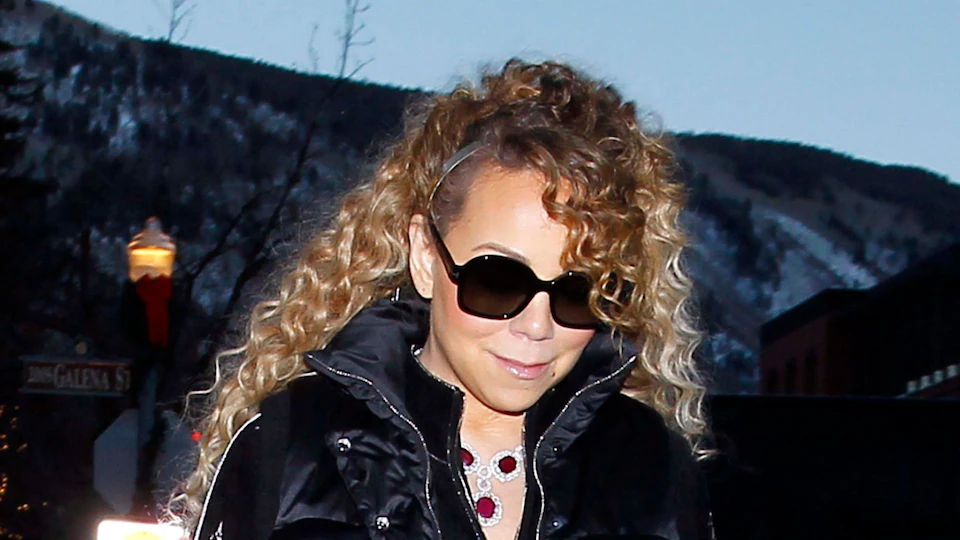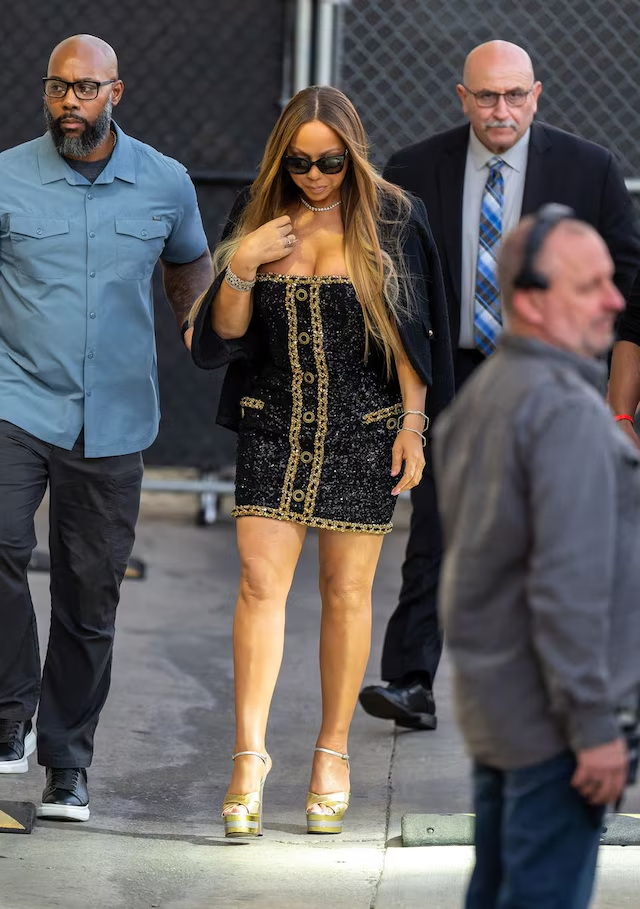Mariah had a very rocky relationship with her family

Tragic news came on August 26 when Maria Carey confirmed that she lost her mother Patricia and estranged sister Alison on the same day over the weekend. The singer has been very very open about the complicated relationship she had with her family, but said in a statement to People, that she spent the last week with her mom before she passed.

LOS ANGELES, CA – NOVEMBER 02: Mariah Carey is seen at “Jimmy Kimmel Live” on November 02, 2023 in Los Angeles, California. (Photo by RB/Bauer-Griffin/GC Images)
Amid her passing, fans are reflecting on Carey’s 2020 memoir “The Meaning of Mariah Carey” which she dedicated to her children Roc and Roe, her ancestors, and Pat, her mother. The short note in the preface to her late mom reads, “And to Pat, my mother, who, through it all, I do believe did the best she could. I will love you the best I can, always.”
Revelations in the book
The word “mother” is used 260 times in Carey’s memoir, and she is very candid and open about their complex relationship. Here are just a few of the alleged stories. “I was a little girl with very few memories of a big brother who protected me. More often, I felt I had to protect myself from him, and sometimes I would find myself protecting my mother from him too,” she writes.
Her mother had a tense relationship with her brother Morgan
Carey explains that her parents divorced when she was 3, and she moved into a house in Northport, Long Island with her mom and brother. But they did not have a good relationship, and she recalled a time when she was six when she had to call the police because her brother pushed her so hard against the wall her mom fell limp on the ground.
Christmas with the Carey’s
Despite the circumstances, Mariah said her mom wanted them to have a ‘wonderful life.’ On Christmas, her mom tried her best to make a great Christmas dinner. “We tried to put all the trauma and drama that infected the rest of our lives on hold and just have a peaceful Christmas meal,” she wrote. But she said it often turned into a “torrent of verbal abuse” once her siblings visited. These experiences are what led her to make her first Christmas album, “I also believe that somewhere inside I knew it was too late to give my brother and sister peace, and my mother her wonderful life, but I could give the world a Christmas classic instead,” she explained.
‘A story of betrayal and beauty’
Like Carey, her mother was a singer, and she knew her daughter was talented. “My voice was recognized as pure talent not only by my mother but also by my teachers,” she writes. Her mom’s friend was her music teacher and she would rehearse songs with Mariah on their drives.
In one of her deepest chapters, Mariah shares how she just wanted to make her proud and believe her. “‘You’ve always been the light of my life.’ My mother told me this over and over when I was a child. I wanted to be her light. I wanted to make her proud. I respected her as a singer and a working mother,” she writes.
“I loved her deeply, and, like most kids, I wanted her to be a safe place for me. Above all, I desperately wanted to believe her. But ours is a story of betrayal and beauty. Of love and abandonment. Of sacrifice and survival.”
According to Carey, “Our relationship is a prickly rope of pride, pain, shame, gratitude, jealousy, admiration, and disappointment. A complicated love tethers my heart to my mother’s.”
Even after all the years, Carey says she was still fantasizing that “one of these days my mother will transform into one of the caring mothers I saw on TV as a child, like Carol Brady or Clair Huxtable; that she will suddenly ask me, ‘Honey, how, was your day?’ before she gives me a report on her dog or her bird, or asks me to pay for something or do something—that she will have genuine, sustained interest in me and what I’m doing or feeling.”
Her mother’s background
Pat grew up in the 1940s and 1950s in Springfield, Illinois, when racism was rampant. She explained that her mom rebelled against it, later becoming active in the civil rights movement. “She was interested in life outside of their tiny, tight, white world. She was intellectually curious and drawn to culture, especially to classical music,” Carey writes.
When her mom married her father, who was black, her grandmother completely disowned her, and she became “almost entirely disconnected from her mother.” After their divorce, she was allowed to visit her grandma when she was 12 who later died on her mom’s birthday.
Her mom made a lot of her dreams come true, winning a scholarship to the prestigious Juilliard School for music, singing with the New York City Opera, and making her debut at Lincoln Center.
She would pass on the love of music to Mariah. “I was surrounded by the love of music, but even more importantly, by the love of musicianship—the love of the craft, the love of the process. When I was a little girl, my mother introduced me to the world of sitting in with musicians: improvising, vibing, and singing,” Carey writes.
But while her mother exposed her to “beauty and culture,” she remembers, “my mother also created persistent turmoil, which caused trauma and deep sadness.” “It has taken me a lifetime to find the courage to confront the stark duality of my mother, the beauty and the beast that coexist in one person—and to discover there’s beauty in all of us, but who loved you and how they loved you will determine how long it takes to realize it,” she continues.
Broken down
Mariah’s relationship with her mother came to a head when she was hospitalized in 2001 when she had already reached fame. She explained that her mom called the cops on her inside the home she had bought her. Police took Carey to an institution and once she was released after several days she said she believed that her mom and brother had set her up as paparazzi were waiting in the woods ready to ambush her.
She believed her mother was enjoying it, “Her glee at the tabloid coverage was no surprise to me. Even though I was the child who didn’t break the rules (or laws, or bottles), my mother didn’t seem to have the capacity to fully celebrate me as I matured into an accomplished artist,” Mariah reflected. “Sometimes I wondered if she couldn’t even tolerate my achievements. I often felt like there was an undertow of jealousy pulling on her smile, though I still included her in many of the major events in my life.”
With therapy, Mariah says she changed how she thinks about the characters in her life. “So for my sanity and peace of mind, my therapist encouraged me to literally rename and reframe my family. My mother became ‘Pat’ to me, Morgan, ‘my ex-brother,’ and Alison, ‘my ex-sister,'” she says.